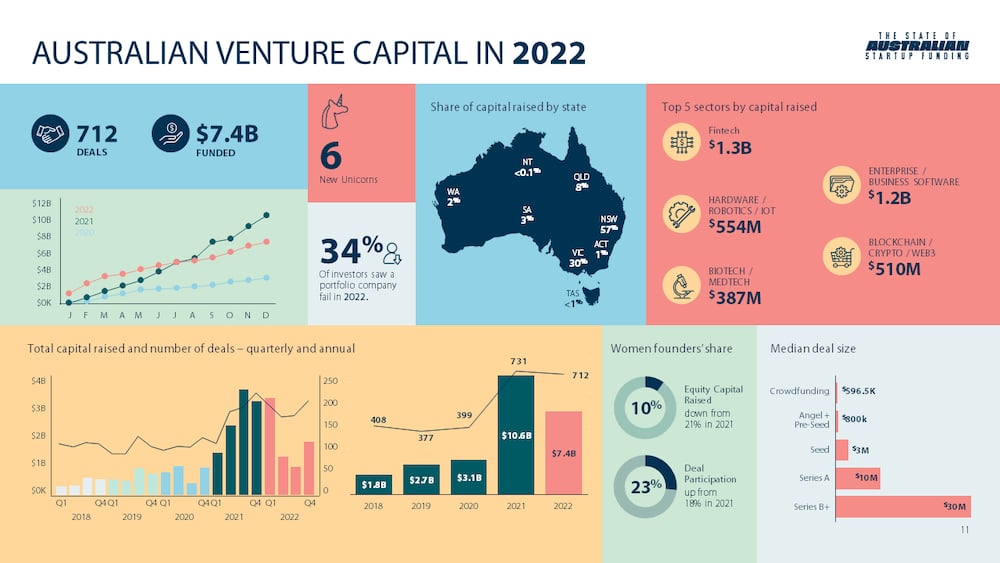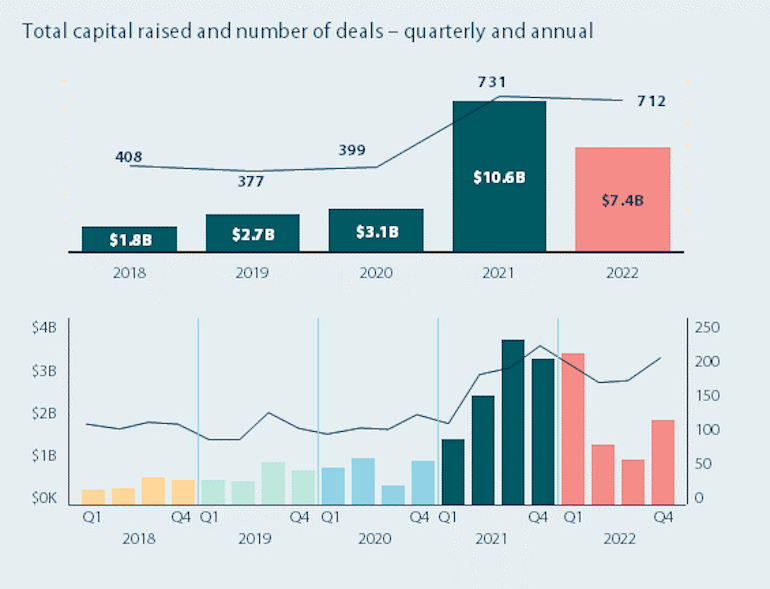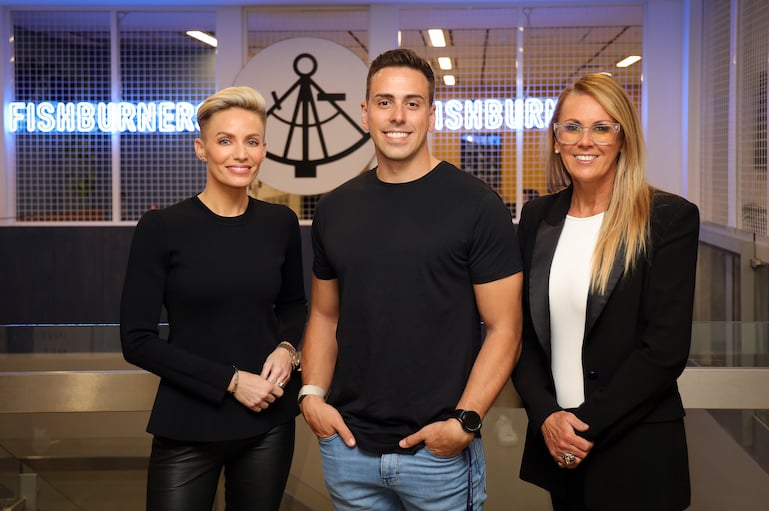- Startup funding in 2022 hit $7.4 billion
- It’s a 30% fall on 2021, but less than a global drop of 35%
- Investors made 712 deals
- Female founders receive more deals, but less funds
- Investment has grown 5x in 5 years
It’s a great time to be an early-stage founder, a new analysis of Australian startup funding for 2022 reveals, with a record number of founders backed in the last year.
The second annual edition of The State Of Australian Startup Funding report, from Cut Through Venture and Folklore Ventures, reveals Pre-Seed and Seed stages reach record levels in 2022 in defiance of a fall in overall investment by around 30% – $3.2 billion – to $7.4 billion last year.
To put it in perspective, the 2022 numbers continue an astonishing growth story for local investment in such a short space of time. 2022’s $7.4bn is still five time bigger than 2018’s $1.4bn, three times larger than 2019’s pre-pandemic level of $2.7bn and more than double the size of 2020’s $3.1bn.
Source: The State Of Australian Startup Funding
Fintech once again attracted the lion’s share of funding at $1.3 billion, but enterprise and business software is growing strongly, reaching $1.2bn in 2022, and with fintech slightly on the nose with investors following massive falls in valuations for BNPLs such as Klarna, and the failure of ASX-listed Openpay, business SaaS looks set to become the favourite in 2023.
Australian investment outperformed its global peers – VC funding fell by 35% globally – and in the context of public markets and valuations, remained remarkably bullish over the last 12 months, with investors still eager to back the next potential unicorn.
Deal numbers in 2022 climbed above 700 for the second year in a row at 712 – just 19 less than 2021’s 731. But no doubt to the relief of investors and VC teams on due diligence, the frantic pace of 2021’s overheated market abated.
The Cut Through Venture funding report found that 88% of surveyed investors reported longer fundraising processes, with 61% were taking longer to decide on investments, even when a strong appetite to invest remained.
Investing remains competitive
More than a third (35%) of investors surveyed reported that early deals were more competitive than ever.
The incredible show of confidence comes at the right time for Australia’s founders and VCs as recent market challenges triggered interrogations from many around the future of funding in Australia.
But the big difference last year is a drop in mega rounds above $50 million and outlier deals at every stage. The number of sub-$5 million investments remained steady amid broader falls, while total funding for early-stage startups increased by 7%.
And there will be no shortage of capital available for the right founders over the next few years, given that the top three funds, Airtree, Blackbird and Square Peg raised a staggering $2.4 billion in new funds last year, with Blackbird raising Australia’s first $1 billion VC fund. All three have pledged to continue to back early-stage assupporting portofolio companies in later stage rounds.
Report co-author Chris Gillings, founder of Cut Through Venture and partner at later stage VC fund Five V Capital, said that while there’s plenty of dry powder in VC wallets for the years ahead, it’s being deployed more cautiously.
“Given the global environment, it is no surprise that funding was down in 2022. What is encouraging, though, is the resilience that the market showed: it’s a testament to the breadth, depth and maturity of the startup ecosystem,” he said.
Limited Partners (LPs) in VC funds now demand more conservative investment cadence, portfolio companies have been told to reduce costs, and 60% of VC partners reported a decreased LP appetite the report found. At the same time, more than 60% of founders said they plan to raise their next capital round in 2023.
The good news for early-stage founders is angel investing continued on its upward trajectory in 2022, with female angels remaining confident throughout the year, and more bullish about 2023 than their male counterparts. Almost twice as many female angel investors (83% vs. 42% for male angel investors) expect to increase their angel investments next year.
It was a mixed result for female founders, with their involvement in raises increasing, but the size of investments and their overall slice of the capital pie falling.
Deals for women way up, amounts down
Female founder participation hit an all-time high in 2022, but their share of funding dropped to its lowest level in recent years.
Pre-Seed and Seed startups founded by women took in significantly more funding, and 23% of all deals included companies with at least one female founder. However, total funding dropped to 10% — from 21% in 2021 — and they raised a median amount 39% lower than for all-male teams.
Folklore Ventures founder and managing partner Alister Coleman said 2022 was a case of the new normal returning to the old normal.
“The ebb and flow of the last two years is a natural part of our ecosystem maturing, and we should expect funding environments to periodically expand and contract over time, as is the nature of capital markets,” he said.
“Zooming out, there are real reasons to be excited about the abundance of world-class talent and innovation in Australia’s startup ecosystem, and the health of the funding environment captured in this report is a demonstration of just how far we have come over the last decade.”
Amid the uncertainly of the last 12 months, where the pace of deals continued from 2021 before a major slowdown over the second half of the year, Coleman believes the momentum will remain strong when it comes to backing new startups.
“In 2022, we saw early-stage investment reach an all-time high, and looking forward, we believe this trend will continue off the back of significant dry powder in VC funds and a natural tendency for difficult times to be a catalyst for great innovation,” he said.
“Folklore has long held that startup investing is a long-term journey beginning with a first cheque, so we begin 2023 excited and ready to support the next generation of Australian startup success stories.”
Cut Through Venture uses data collected from more than 80 venture capital funds, alongside reporting from media and founders to built the most accurate picture of the local investment sector. All up, survey data from more than 500 Australian founders, venture and angel investors helped build the most comprehensive picture of local startup investment
And those backing the The State Of Australian Startup Funding report are JP Morgan, Silicon Valley Bank, and Deloitte.
Silicon Valley Bank’s ANZ market lead Sara Rona said they “are still very optimistic” about Australia as a maturing startup ecosystem, despite the current macroeconomic headwinds.
“The funding data from the State of Australian Startup Funding report shows that Australia’s ecosystem has remained resilient, with significant opportunities for growth in some sectors in 2023 including in its unique strengths like SaaS companies and climate tech,” she said.
The full report is available for free at australianstartupfunding.com

Source: The State Of Australian Startup Funding











